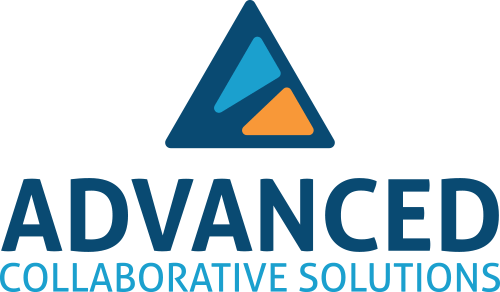5 Books That All Achievement Teams Should Read: 2022 Edition

By: The ACS Team
How did you do on that 2022 reading resolution? The ACS team did pretty well, if we do say so ourselves. We believe wholeheartedly in the importance of continuous learning and one way we love to learn is by digging into books for new ideas and perspectives. Achievement Teams demonstrate continuous improvement and learning through their collaboration, critical thinking, reflection, and reiteration. On the ACS team, we honor time for our own professional and personal development and we encourage our educators to do the same. If you’re looking for a book recommendation to aid in your development, take a look at our top five books from 2022, each one representing one of our teammate’s unique reflections, as well as why we think our ACS community will love it. Happy reading!
Book Recommendation from Steve Ventura
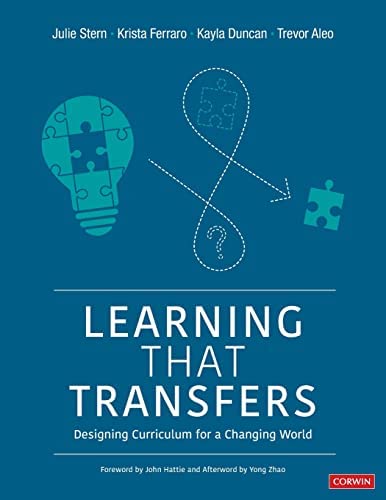 Title: Learning That Transfers by Julie Stern
Title: Learning That Transfers by Julie Stern
Summary: This book is helping me grasp a more comprehensive understanding about how students transfer learning. Transfer learning is the most elusive of the three phases of learning (surface, deep, transfer) and it is the most difficult to explain to others. This book provides a useful framework, but takes some focus and patience to grasp. At first glance, you may be overwhelmed, but once you understand the format, you begin to see the power of having students use their surface and deep learning and applying it to a new or novel situation. One of the best examples from the book to help understand this concept is comparing a master chef to a novice cook. Purchase two random bags of groceries containing several different ingredients and give one bag to the chef and the other to the novice cook. The chef will be able to easily retrieve their surface and deep level knowledge and prepare a world class meal, even though the ingredients were selected for them. The novice cook will likely need a cookbook.
Impact and Implications: As we continue to refine Achievement Teams, we want to share with teachers how to better instruct students using surface and deep level learning and to design learning that truly transfers. Pick up this helpful text to level-up your transfer learning instruction and coaching.
Book Recommendation from Michelle Ventura
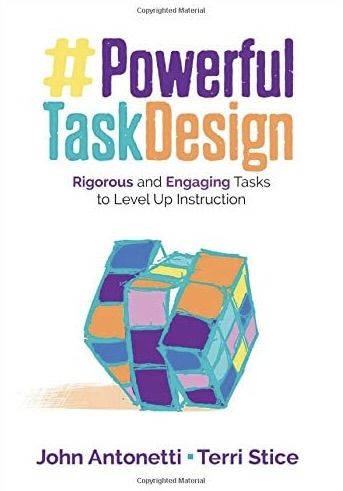 Title: Powerful Task Design: Rigorous and Engaging Tasks to Level Up Instruction by John Antonetti and Terri Stice
Title: Powerful Task Design: Rigorous and Engaging Tasks to Level Up Instruction by John Antonetti and Terri Stice
Summary: As soon as I began reading this book, I could not put it down! It applies to educators across all grade levels and disciplines. The tools and examples provide replicable ways to analyze, design, and cognitively engage students in learning. Research shows that student performance is directly correlated to the power of the learning task, and this book will help teachers design powerful lessons to positively impact students and their performance. Throughout the book, the authors weave in examples of ways to use the Powerful Task Rubric, use technology to complete interactive tasks, and look for ways to create more rigorous and engaging lessons for students.
Impact and Implications: As an educational consultant and former teacher, this book is a must-read for educators looking to design lessons with rigor and engagement. Achievement Teams use data to reveal strengths and gaps in student learning, incorporate strategies, and design tasks to meet the needs of all students. At ACS, we continue to provide strategies teams can implement during their Achievement Teams cycle to close the rigor divide uncovered during the analysis of student work. This book offers a roadmap for teachers to design lessons that allow students to make personal connections to what they are learning and formulate their own thoughts about the content.
Book Recommendation from Angela Buckingham
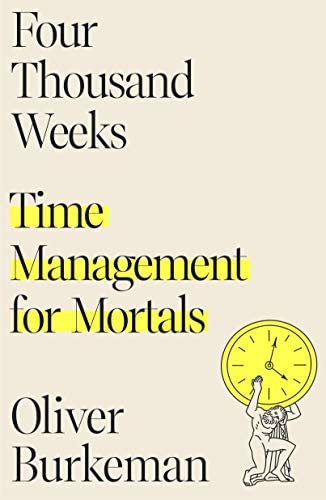 Title: Four Thousand Weeks: Time Management for Mortals by Oliver Burkeman
Title: Four Thousand Weeks: Time Management for Mortals by Oliver Burkeman
Summary: I first encountered this book when Jim Knight recommended it to me, and it did not disappoint! I naively thought it was going to give me tips about how I could fit it all in. Instead, I was met with “an icy blast of reality" – that to be human means I won't have time for everything I want to do or that others want me to do. Burkeman recommends that we “stop beating [ourselves] up for failing" (p.32). By seamlessly weaving history and research with profound insights and an amazing appendix ("Ten Tools for Embracing Your Finitude"), this book caused me to stop, think, and reconsider my perspective on time. From considering distractions in my own life to a heightened understanding that life is what we choose to pay attention to, I now consistently reflect: Does my attention align with my intentions?
Impact and Implications: While in education, we all wish we could have more time. In reality, we are only human. Our lives span for about four thousand weeks, so it is crucial to learn how to prioritize and hold our attention with what will result in the highest impact for students. In his book, Burkeman suggests that we “focus on doing a few things that count" (p.44), and this is exactly what successful Achievement Teams do. Too often, as a consultant and coach, I see teacher teams try to do and talk about everything, skimming the surface, because there isn't enough time. However, when coaching teams using the four-step Achievement Teams protocol, we are able to collectively take a deep dive by choosing a powerful, shared student-learning goal, gaining teacher clarity, learning together, and coming to consensus on high-impact strategies. Through celebrating student growth from pre- to post-assessments, teams realize that focusing on what's most important can actually be quite liberating and empowering and, in turn, builds collective teacher efficacy, which has the highest influence of student achievement.
Book Recommendation from Elena Sammon
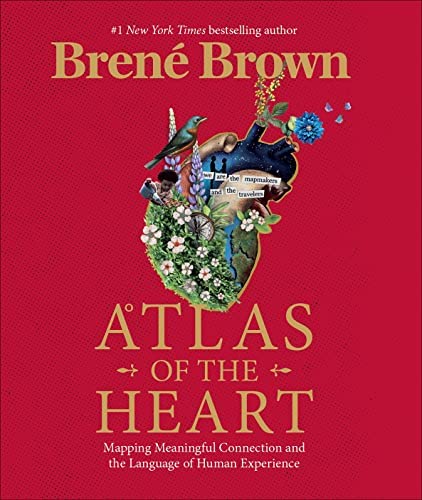 Title: Atlas of the Heart by Brené Brown
Title: Atlas of the Heart by Brené Brown
Summary: I've always been fascinated with murals, mixed media, and abstract art, so I think that's why the cover of this book intrigued me. It depicts a human heart pieced together by images that represent different emotions, creating a so-called “Atlas of the Heart.” Each chapter begins with the phrase, "Places We Go When…" and is followed by a way of being and feeling. Within each chapter, Dr. Brown unpacks emotions that each of us feel, weaving in research that explains the psychological, physiological, and/or environmental elements that act as catalysts or influencers of these emotions. I initially dove into this book hoping to receive tips, sentence stems, or advice on what to do when I experience the less desirable emotions (aka “Please fix me, Dr. Brown!”). But that is not what this book is meant to do. Rather, Dr. Brown provides a way to distinguish one emotion from another, and creates a language pathway for readers to make sense of what we hear in our heads and feel in our hearts. Dr. Brown shares, "Language is our portal to meaning-making, connection, healing, learning, and self-awareness. Having access to the right words can open up entire universes" (pg xxi). When we have language for how we are feeling, it's much easier to connect with our family, colleagues, and community.
Impact and Implications: Achievement Teams use a four-step protocol to engage in conversations that develop collective intelligence and inspire collective action. As a coach and consultant, I have often witnessed the level of vulnerability and trust that these conversations require of team members. Dr. Brown describes vulnerability as "the emotion that we experience during times of uncertainty, risk, and exposure" and that vulnerability is "our greatest measure of courage" (pg. 13). When coaching teams, I've found that encouraging team members to share stories, ask questions, and lean into discomfort can help them develop trust-building language and resilience. High trust, resilience, and the Achievement Teams collaborative protocol provide a space for teams to do the courageous work necessary to positively impact students' lives.
Book Recommendation from Ashley Taplin
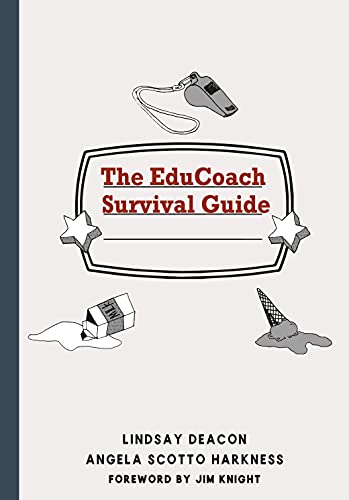 Title: The Educoach Survival Guide by Angela Scotto Harkness and Lindsay Deacon
Title: The Educoach Survival Guide by Angela Scotto Harkness and Lindsay Deacon
Summary: This book includes practical scenarios to support teachers, teams, and ourselves. As the authors wrote, each chapter includes ways to:
1. Choose your own best plan of action
2. Game out contingency plans and follow-up steps
3. Gather the right tools and supplies
4. Find sources of inspiration
5. Protect yourself from burnout
I love the specific and applicable way it is written with supportive and practical ideas. The book also includes printable resources that can be used with teachers and teams.
Impact and Implications: Every time I use advice, resources, or ideas from these authors, I have experienced great success. I have shared the book with many others because it is so applicable to any path you may be on as a coach. I have also connected with the authors through Twitter chats, and communicating together has been such an inspiration. This mirrors the same connection and inspirational support I’ve experienced working with Achievement Teams and couples so well with my educational work.
As Socrates once said, “I am the wisest man alive, for I know one thing, and that is that I know nothing.” We hope to keep the spirit of continuous learning going strong in the year to come. Let us know YOUR thoughts on the books above! Any additional reading recommendations for 2023? Send them our way or let’s chat in person at our 2023 Achievement Teams Certification!
